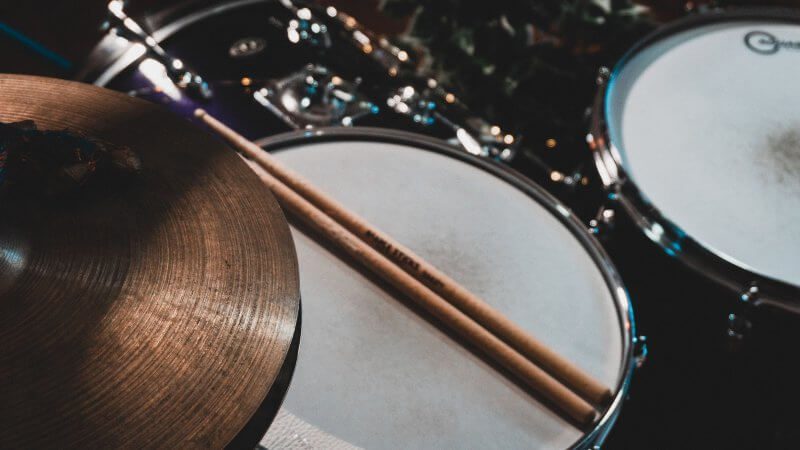 As you learn how to play the drums, a lot goes into how effective your drum practice routine is. Many new drummers think as long as they spend a lot of time with their drumsticks in hand, they’ll be well on their way to playing like a pro. However, time isn’t the only factor that matters! Today, we’re going to share our 8 best tips for how to practice drums effectively.
As you learn how to play the drums, a lot goes into how effective your drum practice routine is. Many new drummers think as long as they spend a lot of time with their drumsticks in hand, they’ll be well on their way to playing like a pro. However, time isn’t the only factor that matters! Today, we’re going to share our 8 best tips for how to practice drums effectively.
What’s the Best Drum Practice Routine?
When you’re learning to play drums, you want to create a routine that will help you develop good practice habits and learn drumming skills. We suggest these 8 helpful drum practice tips for an efficient routine:
- Make a practice plan.
- Maintain a positive attitude.
- Follow the 80/20 rule.
- Use a metronome.
- Pay attention to posture.
- Mix up your practice.
- Set up your practice area.
- Have fun!
Make a Practice Plan
One of the things you can do to get the most out of your drum practice is to set goals for each session. For instance, if your hand techniques are more advanced than your foot techniques, you should place more emphasis on practicing foot techniques during the next few weeks.
Then, you can gradually include more and more hand technique exercises until you obtain a perfectly balanced practice schedule. Consider keeping a practice journal that you can check at a later date to see what exactly worked best, and plan future practice sessions based on your strengths and weaknesses.
Maintain a Positive Attitude
As with learning any new skill, it’s important to stay positive when learning the drums. You don’t want your own fear of failure to prevent you from developing the attitude you need to succeed.
So what can you do? If you feel that drumming is just too difficult for you, you can set easier goals to help you get inspired. You can also work with a drum teacher to who you can express your concerns. They will help you create a ‘plan of attack.’
Follow the 80/20 Rule
The 80/20 rule is simple: 80% of your success is determined by only 20% of your efforts. So, the trick is to determine where that 20% lies and focus on that.
Reflecting on your drum practice plan, whatever you’ve identified as your weakness should make up a big part of that 20%. By following this rule, you can eliminate the “useless” practice and instead really hone in on your goals and progress.
Use a Metronome
Since a metronome emphasizes rhythm problems, using this tool may be discouraging, especially in the beginning. However, it’s the only way to improve your timing and help you stay in control of your playing. If you continue to practice with a metronome, you’ll be able to develop a solid groove and play the drums like a pro.
Pay Attention to Posture
One of the most overlooked drum practice tips is maintaining good posture. This plays an essential role in building physical habits, which can make or break your ability to play. Your posture affects your speed, control, power, and overall technique.
Since the posture you adopt when practicing will become second nature over time, you need to pay attention to this from the very beginning. In addition, specialists advise drummers to warm up their muscles before a drum practice session if they want to gain speed and endurance.
Mix up Your Practice
While you’re using the 80/20 rule as your practice, keep in mind this doesn’t mean just practicing the same thing over and over. That can get boring! Instead, make sure to mix in fun songs and new things, jam with friends, play along with your favorite music, and practice in new ways (such as without your actual drum set).
If you feel like you’re stuck in a rut, don’t be afraid to speak with your drum teacher. He or she can offer advice and give you new things to practice, so you stay motivated and passionate about your playing.
Set Up Your Practice Area
Setting up a comfortable, inviting practice area will help you find joy in what you do, encouraging you to practice more. You might consider adding a mirror to your practice space so you can check your posture. You can also record yourself using a video camera, then watch it to review your performance with a clear mind.
Have Fun!
While drum practice needs to be efficient, you want to be sure you enjoy yourself! Play what you love to play and practice songs you like. This way, you’ll learn new techniques, develop excellent drumming skills, and become a pro without even realizing it.
As you learn how to practice drums, we highly recommend working with a professional drum teacher to help you develop your skills and grow your confidence.
Do you have any other drum practice tips? Let us know in the comments below!
Photo by Chiara Cremaschi
Suzy S.

